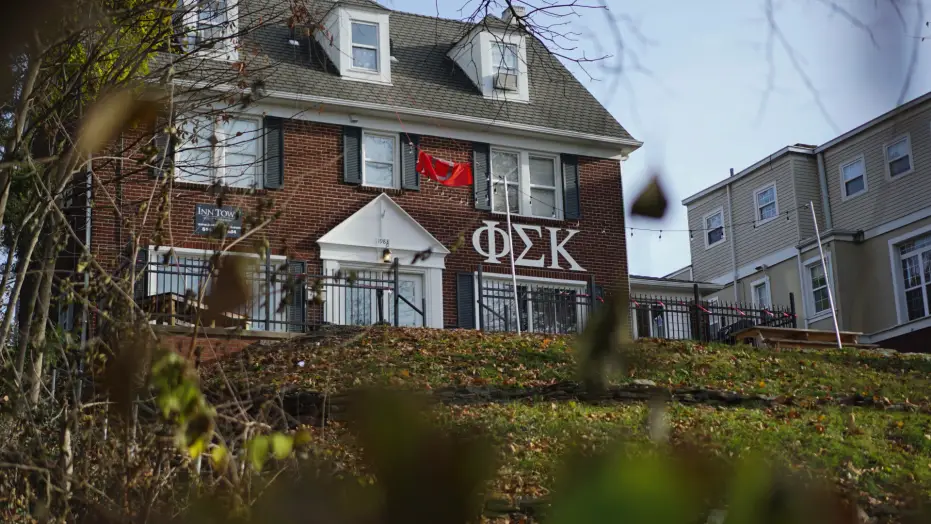On the morning of Monday, November 13, the body of Texas State student Matthew Ellis was found in an off-campus apartment. Ellis had spent Sunday night at a social event with friends and members of Ellis’ would-be fraternity, Phi Kappa Psi. As a result of Ellis’ death, Texas State President Denise M. Trauth suspended all Greek social events, which includes chapter meetings, philanthropic activities and initiations for new members.
Ellis joins the ranks of other young men pledging to fraternities whose lives have been cut short. His death is the fourth in the list of pledge-related deaths in 2017, which begins with the death of Timothy Piazza. In the early hours of Saturday, February 4, Penn State student Piazza was declared dead at Hershey Medical Center. Piazza had been at the Beta Theta Pi house going through a pledge ritual, which involved heavy alcohol consumption that rendered him nearly unconscious. As the night continued, Piazza injured himself after falling multiple times due to inebriation. At 10:48 a.m. the following morning, brother Ryan McCann called 911 after others discovered him unconscious on the floor.
The grisly nature of Piazza’s death—his prolonged suffering, the inattention of his potential brothers and the preventability of Piazza’s physical injuries—is what struck the hearts of many parents and college students across the nation. For those beyond their college years, Piazza’s death hit close to home and reminded parents of the dangers that could face their children in college. For those in or close to their college years, Piazza’s death reminded them of the risks that come with excessive alcohol consumption and freedom in young adulthood. In either circumstance, Piazza’s death marked another stain on the reputation of fraternities and, more broadly, all-male social circles.
The circumstances surrounding Piazza’s death have returned to the public eye in the past few weeks after evidence of the night of his death, which had allegedly been destroyed, resurfaced. While this is a less graceful example, fraternities have always had strengths for protecting their organizations and maintaining the status quo.
For example, at the University of Michigan, several presidents of fraternities and the Interfraternity Council (IFC) gathered on November 9 to vote on a measure to suspend all social events indefinitely, citing allegations of sexual assault, hazing and drugging. Members of the council were encouraged to vote in favor of a self-imposed, indefinite ban rather than a potential ban from the University or North American Interfraternity Council. The measure passed, and the suspension was put in place. The IFC can choose to vote to lift the ban when they see fit
Other fraternity councils were not so quick to convene or lacked the opportunity to do so. Florida State University President John Thrasher suspended all Greek activity after the death of Pi Kappa Phi pledge Andrew Coffey. Louisiana State University suspended their Phi Delta Theta chapter after the death of pledge Maxwell Gruver. More recently, Ohio State University halted the activities and recruitment of thirty-seven fraternities on campus after similar charges of hazing were made.
Compared to the Greek systems of its fellow state universities, the University of Michigan’s IFC made a wily move in the interest of self-preservation. Sure, they imposed their own restriction on social activities, but it’s preferable to an administrative ban and possible unwanted oversight. The line of thought, perhaps, is that the Greek system should be able to continue its activities once the buzz surrounding the allegation subsides and the public eye turns away.
This same political shrewdness and demonstration of parliamentary procedure that the council at Michigan has shown sustain the Greek system. Most, if not all, fraternities say they eschew the typical fraternity behavior of binge drinking and hazing, but only as a public gesture. The presentment in the Piazza case details the chapter’s “dry” and no-hazing policy and reveals the clear disparity in the brothers’ actual behavior. It’s easy to see the necessity of the artifice when the consumption of alcohol is illegal for most of an undergraduate’s time in school—yet it does not justify it.
The relative savviness of the Greek system makes it nearly impossible to pin down. There have been multiple rallies against the system and the culture it perpetuates in recent years. With the rise in awareness and discussion of sexual assault cases, some argue that fraternities foster the attitudes that can be seen in the cases of Weinstein and other high-profile men. Others contend that fraternities are essential to shaping a young man’s outlook on the world and providing him with a social network in college.
Certainly, fraternities provide young men with opportunities that are unparalleled. A fraternity provides a party venue that can double as a residence, a rich social calendar and academic resources that have been collected over the years. The engagement that Greek life provides has also been linked to higher graduation rates as compared to non-Greeks and a sense of belonging that can be difficult to establish for oneself. Ellis may have been in pursuit of this when he decided to rush.
All in all, the Greek system is a massive network of people connected by one legacy, which will be impossible to dismantle in short order. Caitlin Flanagan’s piece in “The Atlantic” chronicles the long history of fraternities, from their initial rebelliousness that pushed against the norms to cultural shifts in the ’80s that led Greek life to define the norms for future generations. While the suits against fraternities brought on by allegations of sexual harassment, reckless hazing and pledge death seem poised to inaugurate the demolition at any moment, some signs point in other directions. Fraternity culture brands like Total Frat Move, Barstool Sports/5th Year and Old Row Official are healthier than ever on social media. Instagram videos, which range from innocuous cultural references to dangerous bouts of drunken debauchery, are effective at conveying and sharing Greek culture to a wide demographic.
The deaths of Ellis, Piazza and others are tragic. There’s no doubt about that. However, Greek institutions have managed to push against any attempt for justice, time and time again. Fraternities have been defining college culture for the past few decades, and they have already mastered the art of viral content on Instagram as other brands struggle to make the transition. To have such a large stake in the landscape of social media shows no sign of weakness. Greek life is as robust as ever.
Thanks to Camelia Juarez for assistance on this article.

















